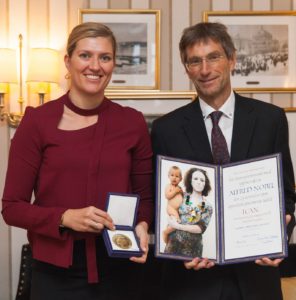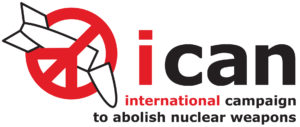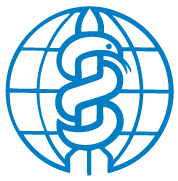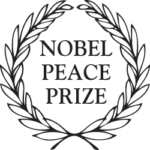
ICAN–the International Campaign to Abolish Nuclear Weapons–was launched by IPPNW in 2007 and received the Nobel Peace Prize in 2017, after campaigning successfully for the Treaty on the Prohibition of Nuclear Weapons, adopted at the United Nations in July of that year. ICAN currently comprises over 600 partner organizations in more than 100 countries. IPPNW remains a leading organization in ICAN, continuing to serve on the campaign’s International Steering Group.
ICAN began in Australia, coordinated by IPPNW’s affiliate MAPW with initial funding from the Poola Foundation, and was officially launched by IPPNW in Vienna in 2007. The campaign’s founders were inspired by the tremendous success of the International Campaign to Ban Landmines, which a decade earlier had played an instrumental role in the negotiation of the Mine Ban Treaty. During the subsequent decade, ICAN built a powerful global groundswell of public support for the abolition of nuclear weapons, helping to reshape the debate on nuclear weapons and to generate momentum towards their elimination. Read more about ICAN’s origins here.

ICAN served as the civil society coordinator for each of three major conferences focusing on the humanitarian impacts of nuclear weapons and nuclear war (Oslo, 2013; Nayarit, 2014; Vienna, 2014). The conferences brought together most of the world’s governments, along with international organizations and academic institutions. IPPNW participated actively in all three conferences, providing much of the medical and scientific evidence about the consequences of nuclear weapons and nuclear war on which subsequent political and diplomatic action was based. ICAN helped garner the support of 127 nations for a Humanitarian Pledge to “stigmatize, prohibit, and eliminate nuclear weapons,” launched by Austria at the conclusion of the Vienna conference.
Building on the outcomes of the humanitarian conferences, ICAN campaigned for the establishment of a special UN working group to examine specific proposals for advancing nuclear disarmament. This body met in Geneva in 2016, and recommended that the UN General Assembly authorize negotiations on a nuclear ban treaty. The negotiations were convened in 2017, and ICAN worked alongside governments to achieve the strongest, most effective treaty possible. The Treaty was adopted by 121 countries on July 7 and was opened for signature in September. The Treaty will enter into force on January 22, 2021, having been ratified by the required 50 states.
As the lead medical NGO in ICAN, IPPNW focuses on the medical and humanitarian consequences of nuclear weapons and nuclear war, including the immediate and long term effects of nuclear weapons use, the climate effects of regional nuclear war (“nuclear famine”), and the health and the environmental impacts of nuclear testing.
Signature and ratification status of TPNW
ICAN Website
For more information about ICAN and IPPNW’s nuclear abolition programs, contact Chuck Johnson.

